|
|
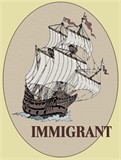
John
Wood, the oldest immigrant
ancestor of the Wood family, and his wife Joan Coleson (1570 - 1 Jun 1654)
came to
John
Wood is also known as John Atwood in some records; his baptismal name is
"Johanem Wood" according to E. F. Atwood; however, I have yet to
locate that record, so it may be a mistake. In the Sanderstead parish birth
records his name is recorded as "Johannes" (not Johanem) with a date
of 4 Feb 1582. Johannes is the Latinized version of John, often used in
official records. He was a twin to Dericke who died in infancy. His baptism was
recorded in both Sanderstead and Gatton parishes. It is not known why his birth
was recorded at Gatton (a parish that is also located in Surrey, about three
miles from
From
the Sanderstead Parish Register of baptism records:
1582 Feb 4, Johannes t Dericke Woode gemille
Nicholaj Woode
Translation:
1582 Feb 4, John and twin Derick Wood born to twin
bearing (father) Nicholas Wood
Since
John Wood was baptized in Sanderstead,
John Wood married Joan Coleson of Saint Martin's Parish,
John
was a "leather seller" in
When
John's father, Nicholas, died in 1586, he left his estate to his youngest son
Richard. Normally the oldest son would inherit his father's estate, so this was
an unusual bequest. Richard died 17 years later in about 1603 and his estate
was inherited by the oldest brother in the family, Harman. According to court
documents summarized by E. F. Atwood in Ancestry of Harman Atwood, John sued his older brother on 1 Feb 1631
saying he should be the heir of the estate, not Harman:
"Harman Atwood doth confess that he hath
a copy of a Court role, dated 37 Henry 8 (1546-47) which proves that Nicholas
Wood was the heir, that Thomas Wood, a young son, had certain manor lands
settled on him by his father, John Wood, and that on the death of said Thomas,
Nicholas Wood was possessed of said lands, according to the custom of said
manor."
Atwood
maintains that this proceeding was used to simply sort out ownership of various
Wood/Atwood lands, and that it was not filed in anger over John's perceived
disinheritance. King Henry had taken some lands belonging to the Wood/Atwood
family some years before when he dissolved the monasteries in
I
believe that Atwood is probably correct because if John was unhappy with his
brother Harman after Richard's death it seems unlikely that he would have named
his own son "Harman" in 1612. E. F. Atwood's conclusion is that this
suit was merely a legal technicality to sort out ownership rights of
Sanderstead. This conclusion would indicate that John did not leave
It
is not known what prompted John to leave
Many
of the Puritans, (who became known as Dissenters), faced discrimination and persecution in England; they sought to
"purify" the Church of England and objected to many of its ceremonies
such as exchanging rings during marriage, inviting "evil doers" to
share in communion, using the sign of the cross in baptism, etc. Many of the
Dissenters' preachers were driven to ruin by the King through excessive
taxation. These persecutions lead to the first of several exoduses of Puritans,
the first of which was to
John may have well have been prompted by religious convictions to leave
his English homeland and settle in the predominantly Puritan
John may have also been motivated by financial considerations. As a
younger son, John had been forced to fend for himself financially. It seems
that his older brother, also named John (born 1576) had knowledge of the
Plymouth Colony for he was recognized by the Treasurer of the stock company
that funded the colony as a "special friend." John's brother's
relationship to the Plymouth Colony may have had an impact on John. It is also
possible that since he had not been successful in his law suit against his
brother Harman for a share in his father's estate, John may have felt that the
New World offered more opportunity than
Our lineage through Gertrude Louisa Wood to Ebenezer: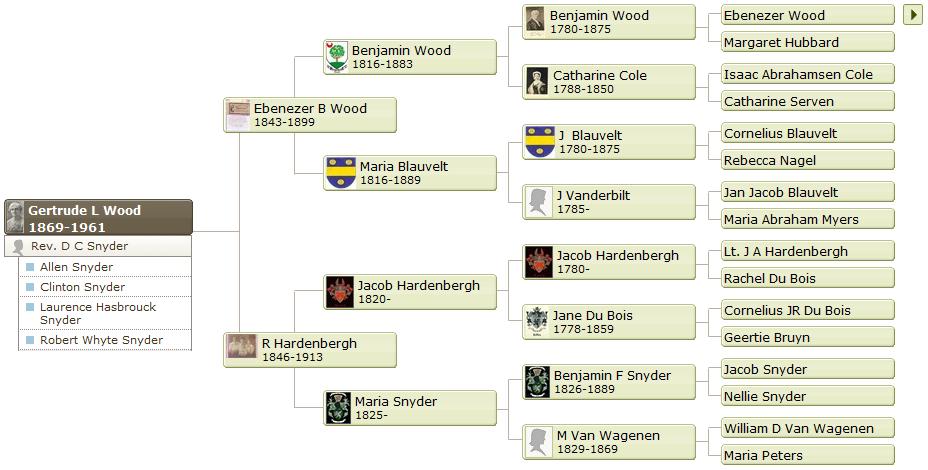 |
From Ebenezer Wood to John Wood, who is our immigrant ancestor:
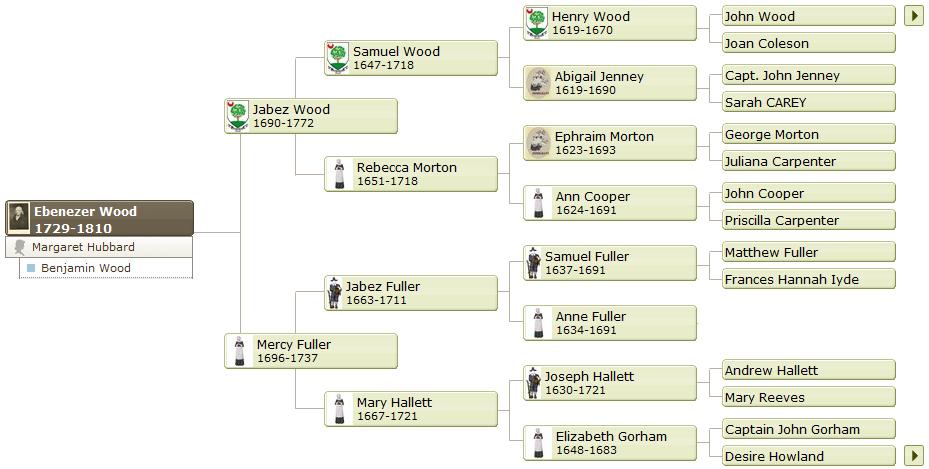 |
Ebenezer Wood:
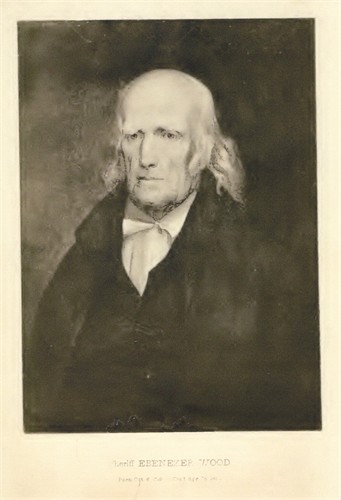
Ebenezer is the son of Jabez Wood (1690 - 1772) and his wife Mercy Fuller (1696 - 1737)
Why this is important is, Mercy Fuller is our line to the ancestors of the passengers on the Mayflower.
Mercy is the great, great granddaughter of Edward and Ann Fuller, as well as great, great granddaughter of passenger
Elisabeth Tilley and her parents John and Joan Hurst, as well as her husband and passenger John Howland (6 in total,
passengers on the Mayflower)
It is of Welsh origin. The name in the last century was indifferently "Atwood" or "Wood," as the Tappan Church records show and as the older members of the family in my early boyhood themselves remembered. In tins century, however, in America, "Atwood" has been given up. The following cut represents the family coat-of-arms, as taken from the records of heraldry. I accompany it with Burke's statement of the family, and also with his description of the coat-of-arms itself, as given in his "Encyclopedia of Heraldry, or General Armory of England, Scotland, and Ireland."
The Family."Wood, alias Atwood, Haiston and Brixton, County Devonshire : a family of antiquity, of which five descents had been seated at Haiston in 1630. The male line expired with John Wood in 1743. One of his sisters married Winter.In my '''Introductory Statement to the Family" I stated that I have transcribed and indexed two Tappan records, one of the regular congregation, and another of an irregular organization that existed from 1767 to 1778 only. The latter contains the baptism of my maternal grandmother, Barbara Wood, referred to above. In the entry the clerk has put her down as Barbara Etwood, and her father as Ebenezer Etwood. The same clerk wrote Pel 111 er for Palmer. In the same way, he wrote Etwood for At wood. This entry shows that Atwood was used in America. Sheriff Ebenezer Wood had a brother Henry who wrote the name Atwood; and his children, to some extent at least, did the same. From the beginning of the present century, as far as I know, the only form used in the family has been the form "Wood." The earliest member of the Wood (or Atwood) family in America whose name with place and date of birth I can give is Ebenezer Wood, father of Rebecca, Barbara, and Benjamin, above-mentioned. He was born in Massachusetts on the 6th of October, 1729. When I began to compile this record it was too late for me to get the link of connection between this Ebenezer Wood and the ancestry in Wales. His own immediate family record I have looked for in vain. Captain Benjamin Wood, before I thought of asking him about this matter, was 92 years of age, and his memory had failed him here. All he recalled was what we had always known, viz., the fact of the Welsh connection. Burke says above: "The male line expired with John Wood in 1743." He speaks, of course, of the family in Great Britain. But one of the line had come to some place in Massachusetts, and had this son, Ebenezer, born Oct. 6, 1729, and through this son the male line is perpetuated to day in generations the fourth and fifth from himself (see line of Benjamin Wood and Catharine Cole in Part IV.). It would probably be possible to find Ebenezer Wood (born Oct. 6, 1729) and his parents on the baptismal register of the parish in Massachusetts, where the former was born, but I had no clue to this parish, and have not been able to give the time which such investigation would require. It may still be done. Our knowledge of Ebenezer Wood begins with his appearance at Tappan, precise date not known, but not earlier, probably, than 1750. He was Deputy Sheriff of Orange Co. (then covering all the territory of the present Orange and Rockland Counties both) for many years, beginning long before the American Revolution, and ending with Feb. 23, 1798, when Rockland County was formed out of Orange. The Court House of Orange County, when he entered upon his office, stood upon the now open plain adjacent to the Reformed Church of Tappan. During the Revolution, it was set on fire and destroyed. The county town being afterwards changed to "New City," the new Court House was erected there. This occasioned the removal of the family to that place, and the change of their church relations to Clarkstown, where their later children were baptized. Sheriff Wood was a man of incorruptible integrity, and of exalted nobility of character. Some are still living who remember him, as he lived till 1810. He made no profession of religion till he reached old age. But he had through all his life the keenest sense of right between man and man, and scorned everything unmanly or wrong. One who knew him well, said to me in recent years, "He could not be made bad." It is said that he was never known to be surprised into a sudden excitement of passion. " His uprightness and his mental and moral balance appeared conspicuously during the trying times of the Revolution, when every effort was made to entice him, as a conspicuous public man, into the support of the British cause. Deeply devoted as he was seen to be to the American interest, he was approached first from the stand-point of corruption, and then from that of intimidation, and when neither of these could move him, he was thence forward, in consequence of his fidelity, bitterly hated, sharply marked, and actively abused by the enemy. The end to him was the loss of all he had. The accumulations, such as they were, of his industry and prudence during the preceding 20 years and more, and even his official papers, were all carried off by a raid. At the close of the war he found himself with about $1600 in Continental money in his hands, which was soon found to be entirely worthless. The country was inundated with counterfeit money by the British, and this quickly depreciated the money of Congress to nothing, because the one could not be distinguished from the other. Sheriff" Wood threw his paper at once into the lire, and quietly remarked, We have our independence and I am satisfied." His subsetpient life was spent at New City till 1806, when he removed to New York, and lived with his children (Benjamin and Catharine) till his death. He died April 18, 1810, aged 80 years, 6 months, and 10 days, greatly beloved and respected by all who knew him. His children and descendants for many years found his name a sure passport wherever they went in Rockland Co. He belonged to a long-lived race. He had a brother Henry who lived to be 98 years old. There is an excellent miniature portrait of Sheriff Wood still in the family. It was painted by his son, Joseph 2nd (see below), when its subject was about 78 years old. A large oil painting has been made from it. It has also been multiplied in photographs which are in extensive circulation. I am happy to be able to furnish a copy of it with these lines, and to assure the family of its exact correspondence with the original miniature, and this was always said, by those who knew the Sheriff well, to be a perfect picture. Sheriff" Etwood married twice. His first wife was Christiana or Christina Tremper (or Trumper), daughter of Johannes Tremper (parents unknown) and Alarretje Felten (daughter of Willem Felten and Christina Smitlin). Johannes Tremper and Marretje Felten had eight children, all born and baptized at Tappan. Th* oldest was Christiana (first wife of Ebenezer Wood), born Oct. 31, 1733, and baptized Nov. 11, 1733. The others with their dates of birth were Anna Catrina (Sept. 13, 1735), Margrietje (Feb. 8, 1737)5 John Jacob (April 28, 1739), Elizabeth (April 5, 1741), Willem (July 13, 1743), Harmanus (Sept. 15, 1745), and Johannes (Nov. 21, 1^747). No one now living remembers Christiana Tremper, and the family have no traditions of her. She was born and baptized as above, married Ebenezer Wood (date of marriage lost through the break in the Tappan records). It was probably in 1754 or 1755, and died March 15, 1768, She was the mother of seven children, one of whom, Elizabeth 1st (see below), preceded her to the grave. The second wife has always been known in the family as Margaret Hubbard. She is on three baptismal records (two at Tappan and one at Clarkstown) with seven of her children, and it is remarkable that the entries give her naine in seven different ways, viz., Hobert, Hoebert, Hoeberdt, Hotter, Hoober, Hopper, and Hubor. (See "Remarks on Holland Names.") The name was properly Hubbard. For all I can get of this lady's parentage and ancestry, see sketch of the "Palmer Family." She was born at Kakiat, Jan. 27, 1746. She had a sister Sarah, who married John Palmer, and another sister Barbara, who died unmarried. Her mother was married a second time to Abraham Snyder. Margaret Hubbard was a woman of characteristics similar to those of her husband. She brought him eight additional children, to whom as well as to the children from the first marriage; the parents were always unspeakably dear. They were both peculiarly tender and affectionate in the home, and both commanded profound respect and deference in society. Margaret was a clear, consistent, and courageous Christian, and distinguished for her calm trust in God. At the time of the sweeping away of her husband's property and papers in the war, she said, "What matters what we have lost, since our country has been saved?" This remark indicated her natural courage and her patriotism, and it was made under the impulse of a lively gratitude to God. The date of her marriage to Ebenezer Wood is lost through the break in the church records. The date of her profession fails for the same reason. The marriage probably took place about the beginning of 1769. She died of yellow fever, Sept. 11, 1798. Her son Ebenezer (her oldest child) had died Aug. 24th, and her daughter Barbara (Mrs. John Michael Shatzel, Jr., my mother's mother) had died Aug. 28th, both of the disease. Thus, within less than three weeks, son, daughter, and mother were all carried away by the fearful pestilence to the grave. Two of her children had died in infancy. Four only survived her. These lived into the present century, one of them down to Oct. 9, 1875. (See personal sketch of Benjamin Wood.) The children of Sheriff Wood, as we have seen, were fifteen in number. The baptisms of the first seven I cannot find. The birth days of these I give from family records. The baptisms of the last eight, except that of Benjamin 1st (who died in infancy, and probably without baptism), are all on the records I have mentioned. Ebenezer and Sarah (the two oldest who received baptism) are on the regular Tappan record. Barbara was baptized by Domine Mutzelius, and is on the record of the irregular congregation. The last four are on the record at Clarkstown, The fifteen are as follows: Fifteen Children of Sheriff Ebenezer WoodBy Christiana Tremper. (first wife)
Children by Margaret Hubbard (2nd wife to Ebenezer Wood)
Note. The family records give the birth of Sarah Aug. 14, 1773, and that of Barbara Oct. 27, 1775. The above, of course, is from the church records. It is thus seen that of these fifteen children, nine only were married. Three of these Rebecca, Barbara, and Benjamin will come up in the Cole lines in Part IV. The fourth Elizabeth, wife of Jonathan Palmer (ist) will appear in "The Palmer Family". Her line is perpetuated through her daughter Sarah, in Michael S. Allison, Esq., of Jersey City, and his brothers and sisters, and through her son Benjamin, in Prof. Joseph H. Palmer, of Yonkers, and his brothers and sisters; and the other five children, as I have shown, are more or less represented to-day in Rockland County, New York City, Brooklyn, and California. |
Catharine Cole and Husband Benjamin Wood
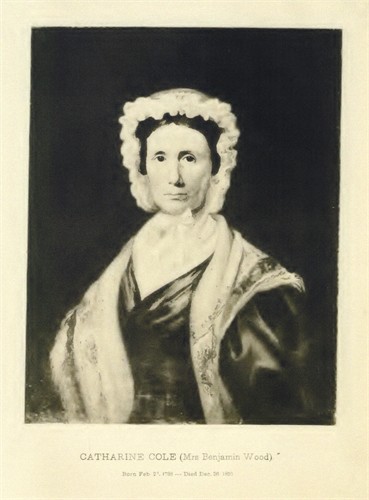 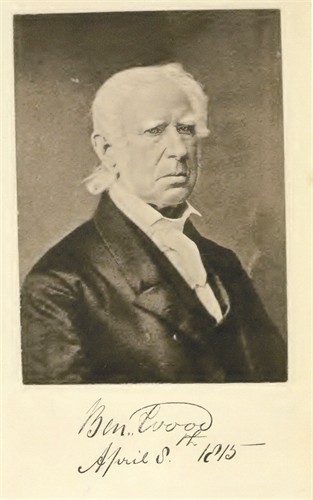
Click here to read Captain Benjamin Franklin Wood's Auto Biography
Benjamin Wood was a Silver Smith and later Inspector of Customs
War of 1812: "Captain Wood" Benjamin's account of his participation in the War of 1812:We now endeavored to adopt the scripture rule owe no man any thing, and to be at peace with all men, and with good health & plenty of work, a selection of choice Christian friends, we knew little, and cared little, about the tumult & confusion of the world, but we learned before long, that we were not only in the world, but of the world also. Great Britain had ever treated us, as a nation, with arrogance, after being obliged to acknowledge our Independence in 1783. Our Government had patiently borne insult after insult, till endurance ceased to be a virtue, when on the 18th of June 1812 Congress on deliberating a message from our Patriotic President Madison, strongly recommending the measure, declared war against Gt. Britain, who had doubtless determined to force us into a war for their immense fleets of armed vessels were strewed along the whole seacoast of the U.S. blockading immediately all our harbours, bays, & rivers; and our Country, unprepared and almost wholly defenseless, by fortifications, implements or munitions of war generally, a considerable panic manifested itself, for a time business, especially in our line being considered a luxury, soon became very dull. I had now accumulated something like 1000 dolls, and my patriotism being somewhat stirred, concluded to raise a company of volunteers (12 month men) for the defense of the City, Congress, having passed a Law for that purpose. I commenced recruiting about the first of October, but in consequence of the great number of recruiting officers, I did no complete my company until the 20th of January 1813 when I received my commission and entered the service with 121 men, rank & file and three lieutenants. We were stationed two months on Eli's Island, three months at New Utrecht narrows, and about nine months at Sandy Hook, having served 14 months instead of 12. When before I had scarcely time to survey the desolation of our house and shop at home, I received unsolicited on the 21st of April 1814 a Captain's commission in the 27th Regiment U.S. Infantry, was stationed again at Sandy Hook, and served till the 15th of June 1815 when the Army was disbanded.Excerpts from Rev. David Cole's book on Benjamin and the War of 1812Captain Benjamin Franklin Wood, We now endeavored to adopt the Scripture rules, ' Owe no man anything,' and ' Be at peace with all men,' and with good health and plenty of work, and a selection of choice Christian friends, we knew little and cared little about the tumult and confusion of the world. But we learned before long that we were not only in the world, but of the world also." . . .Rev. David Cole D. D., "The reference of this last remark is to the war between the and Great Britain, which, breaking out in the year 1812, broke in upon the even life of Mr. and Mrs. Wood, changed their whole career for a time, and probably gave shape to their subsequent history as long as they lived. Patriotism with Benjamin Wood came in with the blood. I need not myself say a word about the causes of the war or its history. These are written in many forms, and accessible to all. The government offering a captain's commission to any one who would enlist a company for the service, Mr. Wood raised one hundred and twenty-one men (sixty-nine of whom he equipped at his own expense) for the defense of the city. He completed his company on the 30th of January, 1813, received his Captaincy, and entered the service. He was stationed first two months on Ellis' Island, then three months at New Utrecht ("The Narrows"), and afterwards nine months at Sandy Hook, making fourteen in all. He had enlisted for twelve months. On the 14th of April, 1814, he received unsolicited and at once accepted a Captain's commission in the 27th Regiment, U. S. Infantry, was stationed again at Sandy Hook, and served till June 15, 1815, when the army was disbanded. From this time to the end of his life he was known as "Captain Wood."
The Narrows and Fort Lafayette,
Ships Coming Into Port (1868), by Samuel Colman
|
Rev. David Cole D. D. is the author of the following book:and his son Captain Benjamin, is covered in David's book.
|


Henry Wood's parents were John Wood
and Joan Coleson, of
His father was a "leather seller" in
Events occurred when he was a young man that caused Henry,
his father and mother, and three of his brothers to leave
Henry married Abigail Jenney
(1619 - 1690) who was born in Leyden,
Henry was admitted a
"freeman" in 1647--he is listed next to John and Stephen Wood on the
list of freemen for that term. A "freeman" was able to vote and
participate in the government of the colony--since taxes were also levied; some
colonists chose not to become "freemen." Henry served as a grand
juror in 1648-56-59-68, and was often on other juries, including one infamous
case where a Alice Bishop was indicted for murdering her daughter by cutting
her throat (
Henry and Abigail first moved to
In Weston's History of
Middleborough and in Hurd's History of Plymouth County,
Henry's purchase of land from the Indian known as the "Black Sachem"
or Tispequin and his wife Anny is documented in a deed dated August 9, 1667.
Tispequin was an important warrior and played a role in the Indian wars known
as King Philip's War in 1675-1677. Henry paid Tispequin 4 for the land. In the
sale document Tispequin is granted the right to gather cedar bark from the
swamp after the sale. This tract of land became known as Wood's Purchase.
In 1665 Henry had one share of thirty
acres on the west side of the
Click here to see the book published in 1888 called Hitory of the Attwood Family in England and United States by Charles Atwood

Henry died in 1670 and is buried in
Henry Wood, born in abt 1619 died in
1670. Alicia Crane Williams describes Henry's estate in detail in documents
taken from Plymouth Colony Records:
His son Samuel and son-in-law John
Nelson were appointed administrators of his estate, October 29, 1670. At that
time his estate totaled �63-03-03.
In
the division of his estate:
On March 4, 1673, four of his
children, with his wife Abigail, were summoned into court to dispose of lands
that they might contribute to the support of the widow Abigail. The parcels of
land were identified as follows:
Henry's death untimely death at about age 50 left his wife Abigail with 12 children.
Daughter Sarah had married in 1667 three years prior to Henry's death, but most of the other children were probably still living at home. It would have been very difficult for Abigail to raise all of these children by herself, and there is no record that she ever remarried. In 1670, after their father's death, his sons David, Joseph and Benjamin chose as guardians John Morton and his brother, Lt. Ephraim Morton. It is not known if this was simply a legal requirement or if the boys actually took up residence with the Morton's. John Morton died in 1673. The other children apparently continued to live with Abigail until they could set up their own homes.

It
is believed that John left
John's
name appears in the ship's register in
John Wood and Joan Coleson and their four boys, (Including Henry) left for
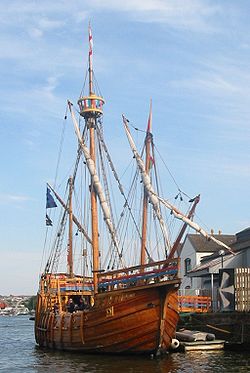
It is possible that, William, also
came to
The precise date of Henry's arrival in the
Plymouth Colony is unknown. E. F. Atwood thinks he may have come in 1635-36,
but there is no certain proof for this as his name does not appear on surviving
ship passenger lists. What is certain is that he was in Plymouth Colony by 16
September 1641 when Henry Wood and Stephen Wood were given 8 acres each at
Loute Pond,
Shortly
after arriving in
"Mr. John Atwood, John Jenkin, John
Weekes, Josiah Cooke, Willm Paddy, Robte Lee, Nathaniell Morton, Edward
Forster, Georg Lewes, and Barnard Lumbard were made free this Court and sworn
accordingly." (The Wood
family relationship with the Morton family would continue for many years.)
John's
wife, Joan, also came to
From
records of land transactions we know that John purchased land in
"had divers porcons allowed them, 3
acres in breadth & two in length, next to the
Citation:
7 Nov 1636
The following summer, in 1638, William Bradford describes an interesting incident
that undoubtedly would have made an impression on John:
"This year, aboute the 1. or 2 or June,
was a great and fearfull earthquake; it was in this place heard before it was
felte. it came with a rumbling noyse, or low murmure, like unto remoate
thunder; it came from the norward, and passed southward. As the noyse aproached
nerer, they earth began to shake, and came at lenght with that violence as
caused platters, dishes, and such like things a stoode upon shelves to clatter
an d fall downe; yea, persons were afraid of the houses themselves. It so fell
oute that at the same time diverse of the cheefe of this towne were mett
together at one house, conferring withsome of their friends that wre upon their
removall from the place, (as if the Lord would herby shew the signes of his
displeasure, in their shaking a peeces and removalls one from an other.) How
ever it was very terrible for the time, and as the men were set talking in the
house, some women and others were without the dores, and the earth shooke with
that vilence as they could not stand without catching hould of the posts and
pails that stood next them; but the vilence lasted not long. And about halfe an
hower, or less, came an other noyse and shaking, but nether so loud nor strong
as the former, but quickly passed over; and so it ceased. it was not only on
the sea coast, but the Indeans felt it with in land; and some ships that wre
upon the coast were shaken by it. So powerfull is the mighty hand of the Lord,
as to make both the earth and sea to shake, and the mountaines to tremble
before him, when he pleases; and who can stay his hand?"
Citation: Bradford, Of
Three of John's sons married into prominent
Puritan families:
John
only lived eleven years in his new American homeland. He died on 27 Feb 1644 in
the Plymouth Colony. His will is dated 20 Oct 1643, and was proved on 5 Jun
1644.
E. F. Atwood in Ye Atte Wode Annals (1930) has provided a copy of the suit John
filed against Harman in
Charles iw. 15-33. Wood Alias Atwood Vs.
Atwood. Feb 1, 1631.
Humbly
comlayning, your orator, John Wood, alias Attwood, of the City of London,
leather seller, that whereas Nicholas Wood, alias Attwood, late of Sanderstead
cum Longhurst, County Surrey, deceased father to your orator, was siezed of
lands, etc., in Sanderstead, and did, about 28 Elizabeth [1586], convey on
parcel of lands called Mancocke and another parcel lying by Parkland, in the
bottom towards Comes Wood Head, and a parcel lying by Mitheley, Great Burye,
called Opeley, and one close lying at Ledowne, and one parcel abutting upon the
house of Henrie Best, all which lands, the said Nicholas Wood alias Atwood, did
convey for the use of Oliphe, his wife, for her life, and for the use of Ritchard
Wood alias Attwood, his youngest sonne, and after the death of the said
Nicholas and Ritchard, the said Oliphe, about 1603, also died; after whose
death, the lands descended unto your orator, as youngest sonne of the said
Nicholas. But now Harman Wood, alias Attwood, being the eldest son of your
orator's father, and lord of the said manor of Sanderstead cum Longhurst, hath
entered the said premises and pretends to disenherit your orator of the same.
ANSWER of Harman Atwood, Gent., Says bill of complaint it devised by the
complainant without just cause and denies that he combined with Thomas Collett,
the steward of said manor, concerning any controversy and says the complainant
has no right or title to said premises. he doth confess that he hath a copy of
a Court Role, dated 37 Henry 8 (1546-7) which proves that Nicholas Wood was the
heir, that Thomas Wood, a younger son, had certain manor lands settled on him
by this father, John Wood, and that on the death of said Thomas, Nicholas Wood
was possessed of said lands, according to the custom of said manor.
Note [by E. F. Atwood]: "The above is merely an abstract made for
genealogical purposes, hence does not always conform to exact wording of the
original. It seems clear that the leather seller was never meant by Nicholas to
inherit these lands, but thence comes our traditions of disinheritance, etc. As
(Sanderstead manor was confiscated a few years earlier, yet John and Nicholas
were left undisturbed in possession of lands bought by Peter in 1346, a Court
Roll was necessary to avoid confusion as to titles of the two lands called
Sanderstead Manor, one owned by the Greshams and one by the Wood-Atwoods."